I’m not from a military family so Memorial Day has mostly been about a three day weekend, grilling, and maybe giving a tiny bit of thought to members of the military who have fought in various U.S. wars. But, in the last couple of years, Memorial Day has taken on so much more significance for me, and it seems rather fitting that this weekend I’m working on my dissertation– writing about the mothers of current U.S. service members who have been deployed in the U.S. war on terrorism.
Mothers, and all members of a service person’s family, often refer to themselves as “the silent ranks.” And they are a key part of the “ranks” of the military in many ways. Next to the troops, family members shoulder the majority of this particular war. Unlike previous U.S. wars (WWI and WWII), the public has not been asked to do much– we are not planting victory gardens, living with rations, working in factories, or collecting scrap metal and even lard for the manufacturing of weapons and supplies.
The military knows how important the families of service members are– for both recruitment and deployment support. You may have noticed the Army recruitment commercials specifically target parents. The Army knows they need parental support to enlist new Soldiers. Often these commercials focus on Army service as an opportunity for training, for an education, for a career, while also telling parents how strong their children will become when they join. Thus the motto “You made them strong: We’ll make them Army Strong.”
[youtube]http://www.youtube.com/watch?v=S8MBbaz61kU[/youtube] [youtube]http://www.youtube.com/watch?v=2TUbnGXqI1s[/youtube]
Despite the fact that the military is changing, and more women are joining, homefront support remains largely gendered. The video below “Army Families = Army Strong” is one that the Army put together as a tribute to the work these silent ranks do during wartime.
[youtube]http://www.youtube.com/watch?v=K5RIHo5rh3c[/youtube]
What is striking (but not surprising) to me about this video tribute is how gendered the home front is. With a few exceptions (a few female Soldiers), this video mostly depicts wives left at home taking care of young children. These families (women and children) need to be strong to deal with the stress and anxiety of having a loved one deployed, and to carry on their day to day lives. The military also needs them to be strong– to hold down the home front, send supportive packages and emails to deployed Soldiers, and to be there for Soldiers to come home to. As the voice over says “they wear a different uniform… theirs is a uniform of strength… the strength of courage, integrity, and sacrifice.” Even if they aren’t deployed to a war zone, families are enlisted to military service along with the Soldiers.
For my dissertation I interviewed 60+ mothers of service members (and hundreds more in online support groups) who also describe themselves as part of these “silent ranks.” I would love to be able to share their incredible stories here, but I only have their permission to write about the for research purposes. So instead I’ll write about what I’ve learned from them about how complicated home front war support is for mothers.
Like other military family members, the mothers of service members also see themselves as members of the military– even when they are more removed from receiving the kinds of benefits a military wife (or husband) would receive. Here are some of the slogans mothers use to identify themselves as a strong, tough, part of the military:
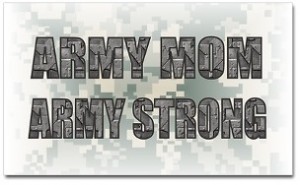

Usually when we think about the mothers of service members, the most publicly active (and anti-war) ones come to mind. Like Cindy Sheehan:
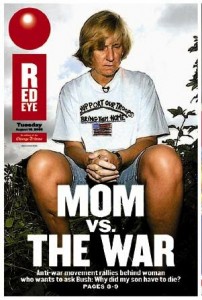

While many mothers of service members take the same war stance as Cindy Sheehan, most have widely different, and often contradictory relationships to war (just as other military family members do, I imagine). My research is about these contradictions. Some mothers disagree with the war, but publicly support their child’s mission– and want the war to succeed. Others disagree with the war but would never say so publicly for fear of being seen as unpatriotic. Some just want the troops to come home safely. Others support the war fully, and some who support the war fully see anti-war mothers like Cindy Sheehan as degrading to the job their children are doing.

Mothers of service members may have opposing ideas about war, but they all feel unbelievable anxiety for their deployed child. They cry in the grocery store when they see their son’s favorite food. They panic every time an unknown car pulls into the driveway, fearing that dress uniforms will show up at their door. And they all feel a duty to their deployed child (to send care packages, buy their child supplies etc.), and feel a sense duty to all the troops and military families– taking part in efforts to make sure the troops and their families feel supported.
Here are some images of different mothers supporting the troops in different ways (these images are all public domain, and none are mothers in my study):

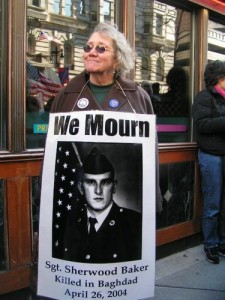
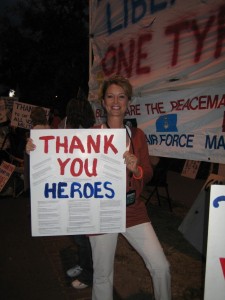
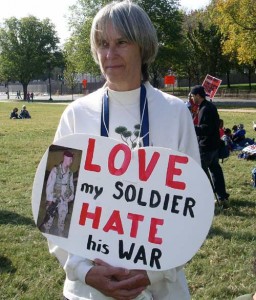
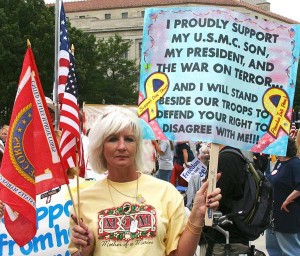
Finally, take a few minutes to watch this video interview with Vicki Castro, whose son was killed in Iraq (“life as you know it stops…”). I can’t embed the video here, but it is worth clicking on and watching.

Comments 9
Tabatha — May 23, 2009
My younger brother is currently at boot camp for the Air Force, and he will spend his 24th birthday there.
I am an ardent liberal and strong opponent to the war, but his enlistment has affected me, and my family, to depths none of us expected ... and he's still stateside.
Thank you for posting this and reminding us that there's always more to any story, always.
anna — May 24, 2009
oh dear, this entry was heartbreaking. thanks for shedding more light on a topic i didn't know much about. however, i can't help but wonder about the fathers- did you focus on the moms for your project because mothers+fathers would have been too broad of a topic...?
wendy — May 24, 2009
@ anna-- I focused on mothers mostly because there is so much interesting feminist literature on the assumed inherently "peaceful mom" and the "fully militarized mother" (see work by Sara Ruddick and Cynthia Enloe for more info). Also, while fathers are sometimes present in recruitment material, they're usually assumed to be okay from the beginning with their child's decision to serve in the military-- it is mothers that are assumed to need convincing that the military is a good choice for their child.
jillhives — May 24, 2009
We should also be thoughtful of the other silent rank of the military: our gay and lesbian soldiers.
'Don't ask Don't Tell" has kept these brave soldiers in the closet, refusing them the same civil rights as the men and women they fight alongside. It's time to quit shaming these soldiers and give them the honor they deserve.
Jeremiah — May 25, 2009
This would be a great concept to extend to other nations, too. It would be fascinating to compare/contrast perspectives of military moms from say, Russia or Rwanda, to those in Iraq or points unknown. Do the communities rally around moms in Somalia the same way as Smalltown, USA? Are bake sales in Baxter, Mississippi better than Belarus?
Inquiring minds want to know!
anna — May 25, 2009
but, might your paper's gender based focus perhaps further the already established assumptions that it might be attempting to deconstruct?
gexx — May 26, 2009
@Jeremiah (and others interested)
In my coursework I came across a book about the women/mothers of the IRA during "the Troubles." I really, really liked it. It analyzed how mothers/motherhood were used as symbols and how these women wielded the power this symbolism gave to them: marching in protest, protecting their neighborhoods, protesting when imprisoned.
"Shattering Silence" by Begonia Aretxaga
http://www.amazon.com/Shattering-Silence-Begona-Aretxaga/dp/069103754X
Kristen — May 27, 2009
Anyone who can't empathize with what it feels like to send a loved one to war should read my novel "Homefront." "Bush's Brain" author James Moore, an award-winning former news correspondent, said he's interviewed a number of families of deploying soldiers over the years and never had an understanding of what those left behind go through until reading "Homefront."
The mothers and the wives consider themselves part of the military during a deployment because, as something like appendages to the military, it is a unit they can immerse themselves in and feel understood.
Civilians aren't able to empathize. They say, "Oh, it must be so hard." The best comparison I can come up with is, if you have a young child, imagine dropping him or her off in a busy parking lot and driving away. Every minute you're gone, wondering what will happen to that child, is what those with deployed loves ones feel for a year or more. You know know if they'll live. You don't know if they're being shot at that very moment. Every second, you're aware of the potential danger, aware that the person you love could have died just then. At that moment.
The military becomes, to many, a sort of family, and an organization with its own language, culture, and experiences. Kind of like the Mafia. :)
"Homefront" was written a year after my husband came back from Iraq. Literary fiction, it brings you inside the mind of a young woman whose love is deployed, and through her you are forced to understand what it means to be for the soldier and against the war, how awkward a position that is, how easy it is to feel like you're going crazy after months or a year of constant worry.
I recommend it not because I wrote it, but because if you're going to discuss war at all, it's best to have as much information as you possibly can - and that includes an intimate look at the soldiers and their families as real people, rather than as uniforms and yellow ribbons, and a better awareness of what they go through.
simono — May 31, 2009
i don't know how to say that respectfully, since you honor your dead soldiers. i respect that. but it from my austrian perspective it seems you describe the military - the instituation paid by gov - as a good employer.